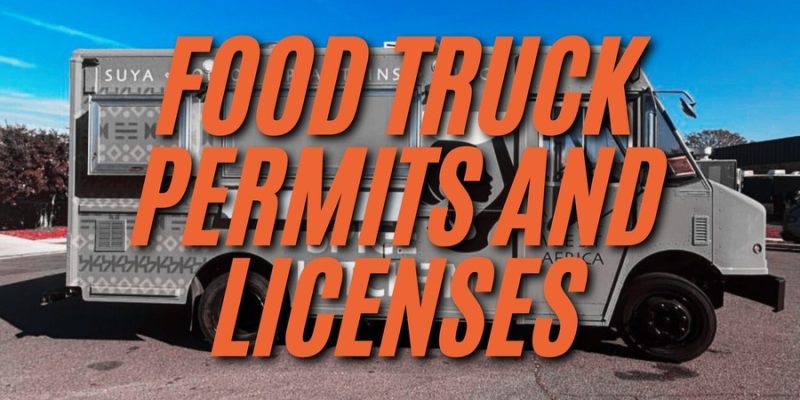Starting a food truck is equal parts menu planning and paperwork. Permits and licenses exist to protect public health and safety, and getting them right will keep you operating without interruptions.
Elhaj Custom Food Trucks & Trailers designs and builds inspection-ready mobile kitchens and serves customers across the U.S. from our home base in Virginia, so we see these requirements up close every day.
Why Permits and Licenses Matter
Food truck permits and licenses exist for one main reason: safety. They protect your customers from foodborne illness, your staff from workplace hazards, and your business from legal or financial setbacks.
Health permits confirm that food is stored, cooked, and served at safe temperatures. Fire inspections ensure that propane lines, fryers, and ventilation systems meet local safety standards. Business licenses and insurance provide a layer of protection if accidents or property damage occur.
Operating without the proper documentation can lead to immediate shutdowns, costly fines, or legal action. In some areas, a single failed inspection or missing permit can result in your truck being forced off the road until you pass re-inspection.
Key takeaway: Permits and licenses protect you, your customers, and your business. They keep your operation safe, compliant, and ready for inspection at any time.
The Core Permits and Registrations Most Food Trucks Need
Regulations vary by state and city, but these are the most common licenses and approvals you’ll need to get started.
1. Business Registration and Local License
Register your business and obtain any required state, county, or city business licenses. The U.S. Small Business Administration (SBA) provides a breakdown of local and state requirements, including direct links to official portals.
2. Employer Identification Number (EIN)
Apply directly with the IRS for a free EIN to open a business bank account, file taxes, and hire employees. Avoid third-party websites that charge unnecessary fees.
3. Health Department Permit or Retail Food License
Your local health department will inspect your food truck for compliance with the FDA Food Code. Expect reviews of food storage, handwashing, temperature control, and waste disposal systems.
4. Food Manager and Handler Certifications
Many states require at least one Certified Food Protection Manager on duty and food handler training for employees. Always verify your city’s accepted training providers before enrolling.
5. Fire Department Inspection and Permit
Cooking with open flames, hot oil, or gas requires approval from your local fire authority. Ensure your hood and suppression systems meet NFPA 96 guidelines and that your truck is built with proper ventilation and clearance.
6. Commissary Agreement
Most jurisdictions require mobile vendors to operate from a licensed commissary for water refills, food storage, and waste disposal. Your health department can provide an approved commissary list or commissary use agreement form if needed.
7. Parking, Zoning, and Route Permissions
Each city has its own vending and parking regulations for food trucks. You may need additional permits to operate in certain zones or participate in events.
8. Vehicle Registration and Insurance
Your food truck must be registered and insured according to your state’s Department of Motor Vehicles guidelines. Drivers must hold the appropriate class of license based on vehicle weight and use.
9. Temporary or Event Permits
Special events, farmers markets, or festivals often require temporary food vendor permits issued by local health departments. These are separate from your main operating license.
Key takeaway: Each city and county has its own permitting structure. Start with the SBA’s official license directory to find your local and state agency portals.
Build Decisions That Make Permitting Easier
- Design to code from the start. Building to FDA Food Code standards minimizes costly change orders. At Elhaj, we fabricate every mobile kitchen with compliance in mind: three-compartment sinks, hand sinks, hot and cold holding units, and wastewater capacity are standard.
- Ventilation and suppression. Our trucks meet NFPA 96 requirements for fire safety, including proper clearances and suppression systems.
- Plan your commissary early. States often require daily reporting to a commissary for cleaning and water disposal. Confirm your facility’s specifications before finalizing your truck’s plumbing setup.
A Practical Step-by-Step Permitting Checklist
- Confirm all city and county regulations for each area you plan to operate.
- Choose an inspection-ready truck or trailer designed to meet FDA and fire code requirements.
- Apply for an EIN through the IRS portal.
- Register your business with your state and obtain a general business license.
- Secure your commissary and maintain a signed commissary use agreement.
- Schedule health and fire inspections with the appropriate local authorities.
- Complete all required food safety training for managers and staff.
- Apply for parking or vending permits through your city’s right-of-way or special events department.
Key takeaway: Following these steps in order helps prevent rework and inspection delays. Securing a commissary and confirming code adoptions before fabrication ensures your sink layout, tank sizes, and ventilation meet inspection standards.
Ready to Get Started?
Starting a food truck takes more than a good idea and a solid recipe. It requires preparation, the right permits, and a build that meets every safety and health standard from the start. Partnering with an experienced builder helps make that process easier and prevents costly setbacks.
Elhaj Custom Food Trucks & Trailers builds mobile kitchens that pass inspection on the first try. Each unit is designed with local codes in mind and built to deliver the reliability and performance you need on the road.
When you work with Elhaj, you get more than a food truck, you get a partner who understands what inspectors look for and what operators need to run safely and profitably.





